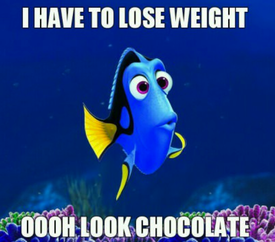Adding iodine to diets..?

MusicKeepsMeSane
Posts: 309 Member
So just a little while ago I came across this article that said adding iodine to your diet can help improve weight loss by helping your thyroid kick into gear. Apparently most people have an iodine deficiency. Is there any truth to this? Would it be worth it to get iodine supplements or is it just a load of crap?
0
Replies
-
bump
 0
0 -
No.0
-
From about.com:A severe iodine deficiency can cause hypothyroidism, and even developmental brain disorders and severe goiter. Less severe iodine deficiency is linked to hypothyroidism, thyroid enlargement (goiter) and hyperthyroidism. At the other end of the spectrum, excessive iodine intake -- both severe and moderate -- is also associated with hypothyroidism and goiter.
We have learned a little about this in my biology class, and the info here matches what my professor has taught us. I can't speak much deeper into the subject, though. My professor suggested that drinking tap water instead of bottled water can help us get our trace amounts of iodine, fluorine, and other elements we need for life. We have grown quite attached to bottled water as a culture and this may be the biggest factor in iodine deficiencies growth.0 -
It is true that most people have low iodine status and that iodine is important for thyroid function however i doubt that simply taking a iodine supplement will help with weight loss. I would go see your doctor and get your thyroid levels tested to see if there is an issue before you take any supplements
also to increase intake make sure you're using iodised salt.0 -
Editing while I search for info.
 0
0 -
Iodine is commonly added to table salt, you have a choice to buy iodized salt or plain. It was added to salt to provide it in our everyday diet. Many people are now opting for sea salt which does not have iodine added. Therefore I believe this could become a deficit in many peoples diets. Some vitamins contain iodine, since I already take thyroid medication I make sure I get iodine in my vitamins.0
-
How sad! I found an amazing article through my school scientific search engine and cannot share it. I suppose I can take screenshots and post the image but that is hard to read.
Anyway - it did say that iodine deficiency affects 15% of the entire world population (1,016,285,355 people everywhere - which sounds like an awful lot but is dispersed unequally over the Earth). The worst cases are in rain forest / jungle areas, and other deeply inland parts of the world. If you leave near a shoreline, or eat like you do, you are likely not affected by this.
K9hrd is right, eating iodized salt or anything else 'iodized' will help get your daily recommended dose.0 -
Again, I have always been told that by eating iodized salt, we decrease our risk of iodine deficiency. Also, seafoods that contain iodine are a plus. I have also questioned the new fad of eating sea salt, as I have noted that it is not iodized.0
-
Okay... the thyroid needs iodine to make thyroid hormone. If you don't have enough iodine, you don't have enough thyroid hormone. Without thyroid hormone, you have a host of problems, the least of which is a slow metabolism.
Conversely, too much iodine can cause thyroid damage and you end up with HYPOthyroidism, meaning your thyroid stops functioning properly, you don't have enough thyroid hormone, and you're in worse shape than you would be if you were just missing a little iodine.
Point is... a little iodine is good. Too much is dangerous.
And... a nice "lay person" article explaining it all: http://thyroid.about.com/od/newscontroversies/a/toomuchiodine.htm
It fits with what I remember from my human physiology and human endocrinology classes.
If you decide to supplement, supplement with care. Don't go overboard.0 -
Opps... I guess I should read more completely instead of skim. Sarah pretty much said what I said already :P Sorry Sarah.
The Mayo Clinic has some good stuff on iodine too... the take home message I got from their site is that you really don't need iodine supplements in the US. Iodine is added to salt, tap, etc...0 -
Get your blood tested for T3, T4, TSH.. if any of them come back low (or TSH too high) you could have an under active thyroid.. If your doctor puts you on meds to correct this you don't need extra iodine as well.
Most cases of Hypothyroidism in later life are mild and happen after pregnancy or the menopause. (in women.. it can happen in men but is more rare) More serious cases maybe a result of things like thyroid cancer where the thyroid has to be removed so you then have no working thyroid and need much higher dose of medication to compensate. Most people take between 50 -125mcg to correct their deficiency.
I was born with mine underdeveloped and not working due to my mum getting blood poisoning when she was pregnant with me. i've been on 300mcg since I was a baby. In the developing brain it can cause alot of complications and disabilities but in adults its very different because your brain has long since reached maturity (hopefully.. for most of us!)0
This discussion has been closed.
Categories
- All Categories
- 1.4M Health, Wellness and Goals
- 398.2K Introduce Yourself
- 44.6K Getting Started
- 261K Health and Weight Loss
- 176.4K Food and Nutrition
- 47.7K Recipes
- 233K Fitness and Exercise
- 462 Sleep, Mindfulness and Overall Wellness
- 6.5K Goal: Maintaining Weight
- 8.7K Goal: Gaining Weight and Body Building
- 153.4K Motivation and Support
- 8.4K Challenges
- 1.4K Debate Club
- 96.5K Chit-Chat
- 2.6K Fun and Games
- 4.7K MyFitnessPal Information
- 16 News and Announcements
- 20 MyFitnessPal Academy
- 1.5K Feature Suggestions and Ideas
- 3.1K MyFitnessPal Tech Support Questions




